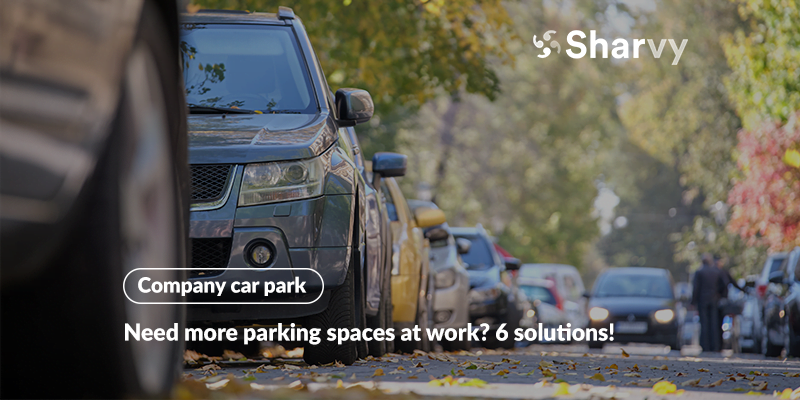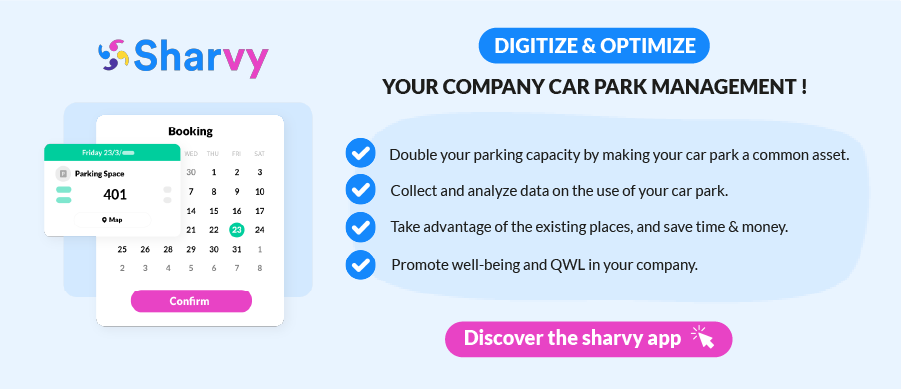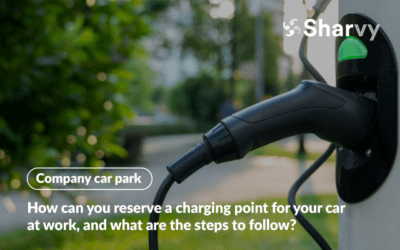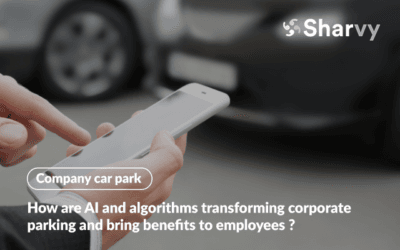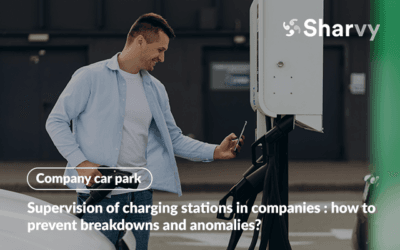Is your company faced with a shortage of parking spaces that frustrates your employees every morning? Is this lack of parking threatening to tarnish your employees’ experience, affecting their punctuality and, by extension, their productivity?
This logistical challenge can lead to frustration and wasted time every day, impacting your teams’ well-being and your organization’s efficiency.
Isn’t it time to strategically revamp your parking management to prevent this issue from hindering your company’s growth?
This article proposes a series of well-thought-out, innovative solutions to meet this challenge pragmatically and effectively.
What are the leading causes of the lack of parking spaces at work?
The most striking cause is your company’s growth and, by extension, the increase in the number of your employees. If your company sees its workforce double from 150 to 250 employees without proportionately increasing your parking spaces, saturation becomes inevitable!
At the same time, the management of reserved parking spaces also poses a problem: do you know how many reserved spaces, such as those for executives, remain unoccupied for a large part of the time, depriving other employees of parking? These spaces could be used more productively by other employees during busy periods. This is known as flex parking.
Moreover, the perception of favoritism, where some people benefit from reserved parking spaces while others have to look elsewhere for space, can create a climate of discontent. This perceived inequality can affect staff morale and lead to unnecessary frustration.
Finally, the absence of a flexible parking management system, such as reservations & alternating hours, can exacerbate the problem by preventing optimum use of available spaces.
So, what are the best ways of optimizing parking spaces at work?
1. Define a teleworking policy to reduce parking requirements.
By encouraging teleworking, you enable a significant proportion of your employees to work from home, reducing the number of people commuting to the office daily.
For example, if you adopt a hybrid model in which 30% of your employees work remotely, the demand for parking spaces will decrease proportionally.
This approach will enable you to manage your parking spaces more effectively and, by offering your employees greater flexibility, improve their well-being and QWL.
Furthermore, by reducing the number of employees using your offices daily, you can optimize your current infrastructure and avoid the additional costs associated with expanding or creating new parking spaces.
2. Invest in a parking reservation system.
Imagine a situation where, thanks to a reservation system like Sharvy, you can accurately predict how many places will be occupied each day, thus avoiding situations where certain employees have to go around in circles looking for a free place.
Could this ability to anticipate & adjust in real-time considerably improve the efficiency of your company car park?
Moreover, by empowering your employees to plan their parking needs, you can foster coordination, reduce potential conflicts, and optimize available spaces.
At the same time, the Sharvy solution enables employees with allocated parking spaces to share their spaces when they are absent, whether for teleworking or business travel.
This way, employees can maintain their privileges while contributing to a more just and flexible management of parking spaces. This approach enhances efficiency and nurtures a culture of sharing and collaboration within your company.
3. Create an effective parking policy.
Before going any further, here is a quick reminder : a parking policy is a set of guidelines, rules, and procedures defined by a company to govern the use and management of parking spaces.
A well thought-out parking policy is not just a luxury, it’s a necessity if your company is faced with a situation where demand for parking spaces far exceeds supply. It’s time to act & implement a solution.
In the long term, this situation can lead to several problems, such as congestion, frustration, irritation & internal conflicts. So, staying in this situation is out of the question! What’s more, there are simple solutions to implement.
For example, start by targeting the measures that will form the pillars of your parking policy. You could think of :
- Incentives measures : adopt incentives such as promoting more rational use of cars and encouraging intelligent mobility For example, reserve spaces for car-pooling (thanks to Sharvy x KAROS) and offer financial assistance for public transport season tickets. These actions encourage a multimodal approach, reduce dependence on the private car and improve the use of parking spaces.
- Preferential measures : employees benefiting from this access are guaranteed a parking space. For example, you can reserve spaces for people with reduced mobility, pregnant women, car-poolers, or those with home-to-work distance constraints. These measures ensure that parking spaces are more equitably distributed and adapted to everyone’s specific needs.
- Penalising measures : Although they are often badly perceived, they are terribly effective. For example, you can put in place a clear system of penalties for breaches of your parking policy, such as allocating penalties to those who reserve a space without turning up on the scheduled day.
Can external solutions be negotiated to compensate for the lack of parking spaces at work?
1. Contact the nearby public car parks.
Negotiate preferential rates for employees who park their cars in a nearby public car park. Such an agreement has several benefits.
On the one hand, you would increase your employees’ satisfaction by relieving them of a significant proportion of their parking costs. This will make their day-to-day lives easier, reducing the stress associated with finding an available parking space, which could have a positive impact on their punctuality and productivity.
Secondly, for car park managers, it would provide a stable and predictable source of income, guaranteed by a regular influx of customers.
More broadly, this initiative would demonstrate your commitment to improving working conditions for your employees, by taking their needs into account and offering them practical solutions.
2. Rent spaces in nearby buildings.
If your business is located in an area with limited parking, you might want to consider renting additional parking spaces in nearby buildings.
This solution would make up for the lack of parking directly on your site, offering a practical & immediate alternative for your employees. This is a strategy that many companies (Sharvy customers) have adopted to meet the growing demand for parking.
However, the cost of this option can quickly become significant, especially when you consider that these fees are added to your company’s other recurring expenses.
In the long term, this solution is not financially sustainable. The accumulation of these costs can weigh heavily on your budget, reducing the resources available for other strategic investments, such as improving working conditions.
What’s more, dependence on these rentals can expose your business to rent increases, as well as the possible loss of these spaces if the owners decide not to renew the contracts.
As a result, this solution meets an immediate need, but is not a viable long-term solution!
This is why the Sharvy solution has been adopted by many companies in this situation. Thanks to automated car park management, not only have they been able to stop renting extra spaces, but they have also made significant savings.
Read the Atlantic Group case study to find out more!
3. Offer a shuttle service between remote car parks & your offices.
By offering a shuttle service, you eliminate the inconvenience of having to walk long distances, often in uncertain weather conditions. Your employees benefit from a more comfortable journey, which can improve their satisfaction & reduce the daily stress associated with finding parking.
What’s more, this device can contribute to better time management, ensuring that your staff arrive at the office on time & relaxed.
It also reinforces the image of your company as a proactive one, putting in place solutions to improve the day-to-day lives of your employees.
In conclusion
There’s no doubt about it: the lack of parking spaces at work is not a fatality, but an opportunity to rethink mobility within your company.
Each solution considered in this article is not just a response to an immediate problem. It’s also an investment in a corporate culture that is more flexible, sustainable & focused on employee well-being.
So why not take this opportunity to rethink your parking spaces and offer your team a more harmonious environment, better adapted to their daily needs?
Got a question? Check out these FAQs!
What are the advantages of using a parking management application to make up for the lack of parking spaces?
Firstly, a company car park management application like Sharvy allows you to optimise the use of available spaces by allocating them dynamically & in real time, thus avoiding wasting precious resources.
Thanks to the possibility of reserving a place in advance, your employees can plan their visit with complete peace of mind, reducing the risk of overcrowding and uncertainty.
What’s more, this solution offers you flexible management, capable of adjusting to the specific needs of each day & particular event, while promoting a fairer distribution of spaces.
By making the availability of seats more transparent, you can also reduce frustration and potential conflicts between your employees, while improving their experience.
Some applications also allow you to encourage environmentally-friendly practices, such as car-pooling & the use of electric vehicles, by allocating preferential spaces, which reinforces your commitment to sustainable development.
What’s more, collecting data on car park usage gives you valuable insights for anticipating future needs & adjusting your parking policies accordingly.
An application like this not only helps to resolve the constraints associated with the lack of space, it also improves the satisfaction and productivity of your employees, while reinforcing your image as an employer who cares about the well-being of its teams!
What solutions can be considered to ease parking in a company with limited spaces?
To address parking challenges, several solutions can be implemented. Firstly, offering free parking for employees with reserved spots (e.g., a monthly subscription to guarantee a space) is an effective start. To prevent spaces from being occupied outside working hours, using parking meters for paid spots, particularly in street parking areas, can help. Companies could also consider nearby underground parking or parking lots for long-term use, as well as park-and-ride options for public transport users.
Additionally, reservation systems or parking cards can ensure vehicle rotation and proper space management. Reserved spaces and special parking permits, such as the European parking card for disabled persons, can also be provided. Clear signage and proper regulation of public street parking can help users find spaces more easily, avoid fines, and stay within designated paid zones.
By implementing these solutions, a company can improve parking accessibility while optimising space management.
How can penalties for non-compliance with parking rules be beneficial?
Penalties encourage compliance with the rules by deterring abuse, which helps to maintain an orderly & fair parking system. For example, penalties for unfulfilled reservations (no-shows) ensure that reserved spaces are actually used by those who need them, improving the overall efficiency of the system.
Want to find out more? Check out our latest articles!
How do you reserve a charging point for your car at work?
How do I recharge my car at work? Do I need to reserve a charging point? What solutions are available? Here are the answers!
How are AI & algorithms transforming corporate parking?
How are AI & algorithms redefining corporate parking? What are the benefits for your company & your employees? Focus!
Supervision of charging stations in companies : how to prevent breakdowns and anomalies?
Why is the supervision of charging stations essential for businesses? How can you prevent breakdowns and ensure their reliability? Focus.
Subscribe to our newsletter!
Resources
Contact us
+44 117 463 6990

